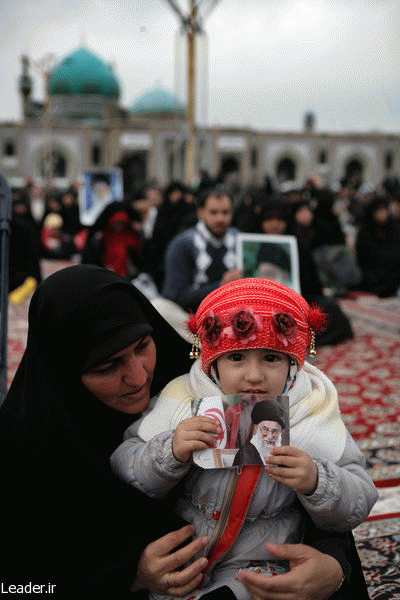Reprinted from Consortium News

An Iranian child holding a photo of Iran's Supreme Leader Ali Khamenei at one of his public appearances.
(Image by (Iranian government photo)) Details DMCA
The achievement of "implementation day" of the Joint Comprehensive Plan of Action (JCPOA), when for both sides the central elements of the nuclear bargain went into operation on Saturday, means that it is going to be a fact of life in global and regional politics for many years. But will it have a profound impact on regional politics?
That is the argument both the Barack Obama administration and U.S. allies in the Middle East who have opposed it have made in the past. While Washington has said the agreement makes it more likely that Iran will eventually come to terms with its neighbors, Israel and Arab states have advanced precisely the opposite forecast, suggesting it will inevitably cause Iran to be far more aggressive and uncompromising.
Both sides have used their arguments as devices to advance their political interests rather than offering serious political analysis. The Obama administration has argued that by closing off the pathways to an Iranian nuclear weapon, the agreement opens up the possibility of domestic and foreign policy changes in Iran.
In perhaps the most far-fetched expression of that argument, Secretary of State John Kerry suggested in an interview with Reuters last August that Iran's Islamic Revolutionary Guard Corps had been "counting on this nuclear thing to give them the umbrella of protection over their nefarious activities, and they object to this precisely because it takes that umbrella away."
That was a poorly conceived self-serving argument: the imagined possibility of having nuclear weapons in the future was totally irrelevant to IRGC involvement with Hezbollah in Lebanon, or to its presence in Iraq and Syria.
The Israelis and Saudis, on the other hand, have insisted that the nuclear agreement would empower the Iranians to be far more interventionist in the region as well as to continue to seek nuclear weapons. The Israelis pushed the idea that Iran would use the additional income gained from lifting sanctions to fund Hezbollah or the Syrian government, making the region more unstable and more threatening to Israel.
Yet the Iranian support for Hezbollah is a fundamental national security investment that has never depended on any additional infusion of resources from the nuclear deal. In fact, the commitment to support Hezbollah troops in Syria was taken in 2012, well before the nuclear negotiations had even begun.
Both Israeli and Saudi officials have suggested that the Obama administration's negotiation of the agreement represented a decision to fundamentally alter its alliance policy by entering into a quasi-alliance with Iran.
The Saudis have carried that theme to a much greater extreme. As F. Gregory Gause wrote in late 2013, the Saudis were already expressing the fear that the United States would "ratify Iranian hegemony in Iraq, Syria, Lebanon and the Persian Gulf in exchange for a nuclear deal."
The Saudi fear of an entente between Washington and Tehran may have deepened since the agreement was reached, but Saudi fears of U.S. acquiescence in a regional distribution of power -- which Riyadh has found unacceptable -- are not really about the nuclear deal itself; rather, they center on Saudi unhappiness with the failure of the United States to go to war in Syria.
Similarly the Israeli objection to the nuclear deal was ostensibly that it wasn't really going to end Iran's quest for nuclear weapons. However, what the Israelis really wanted was to reduce Iran's military and economic power, either through military confrontation between the United States and Iran or through crippling sanctions.
The agreement represents the ultimate failure of that long-term Israeli strategy, but that has nothing to do with the longer-term issues and forces at work in the region.
The agreement is clearly not going to influence regional politics by depriving Iran of nuclear weapons that Iran has had no intention of obtaining anyway. The real issue is whether the process of negotiating has created a new U.S.-Iran political dynamic that can influence the outcomes of the conflicts in Syria, Iraq and Yemen.
That is what both the Obama administration and the Rouhani government appear to be hoping for. Secretary of State John Kerry and Foreign Minister Javad Zarif both suggested that the new relationship helped to quickly resolve the incident involving two U.S. Navy ships that sailed into Iranian waters. Even so, it is highly doubtful that the agreement will have a very deep impact on U.S. policy in the next few years or affect any of the intertwined conflicts that are reshaping the Middle East.
U.S. policy toward Iran is the product of decades of constant anti-Iran news, official pronouncements and opinions. The idea of Iran as an aggressive threat to U.S. interests has become deeply embedded in the country's electoral and bureaucratic politics.
(Note: You can view every article as one long page if you sign up as an Advocate Member, or higher).





